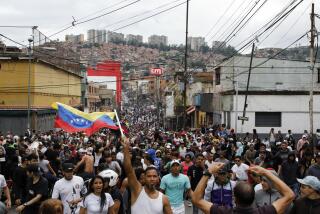Leftist Wins Brazilian Presidency
RIO DE JANEIRO — Luiz Inacio Lula da Silva, a leftist former factory worker and shoeshine boy, won Brazil’s presidential election in a landslide Sunday, riding a wave of popular discontent with unemployment and inequality in Latin America’s most populous nation.
With 99% of the votes counted, the man known universally here as Lula was defeating challenger Jose Serra of the ruling center-right alliance by 61% to 39%.
“The responsibility of governing will be very great,” Lula said late Sunday, claiming victory on a day that also happened to be his 57th birthday. “We will create a country that is more just, a country of brotherhood and solidarity.”
Lula won by promising social reforms for the poor and working people, including food subsidies; more spending on health and education; and an increase in the minimum wage. But he also formed alliances with groups traditionally hostile to his Workers’ Party, including business leaders and evangelical Christians.
Those alliances, and a highly sophisticated media campaign, helped guarantee him a huge show of support -- more than 50 million votes in all -- on his fourth attempt at the presidency.
Lula will be the country’s first working-class president and is the first left-wing candidate elected to the position. The victory for his Workers’ Party -- an amalgam of activists that includes everyone from Marxists to environmentalists -- marks a turn of events not just for Brazil but for Latin America as a whole, where militaries and small elites have usually held a tight grip on power.
“Lula told me the victory wasn’t just for us but for a whole generation which fought for democracy in this country,” Jose Dirceu, president of the Workers’ Party, said Sunday after the first results came in. The party helped lead the movement to restore Brazilian democracy in the 1980s after two decades of dictatorship.
“Now we are already thinking about the future,” Dirceu added.
The Workers’ Party has said it will push to seek better terms for Brazilian producers in negotiations with the Bush administration over the Free Trade Area of the Americas. Lula has said the current proposals amount to an “annexation” of Brazil by the United States.
Speaking to reporters aboard Air Force One while returning with President Bush from an economic summit in Mexico, White House spokesman Ari Fleischer said: “The president congratulates the winner of the election and looks forward to working productively with Brazil.”
Tens of thousands of people, many carrying red Workers’ Party flags, gathered to celebrate Lula’s victory Sunday evening on Avenida Paulista in the center of Sao Paulo, the industrial core of Brazil and the place where Lula got his first job as a factory worker in the 1970s.
Many sang over and over the chorus of Lula’s ubiquitous campaign song: “All you have to do is want it, to make it happen tomorrow.... Vote and say, ‘Lula, I want Lulaaa!’ ”
In downtown Rio de Janeiro, thousands gathered in the Cinelandia square.
“This is a victory that goes even further back than the 20 years of the party’s history, to the long wait for justice in this country,” said Chico Alencar, a congressman-elect from the Workers’ Party.
Before Lula, Brazil’s last leftist leader was Joao Goulart, a vice president who assumed power in 1961 after the centrist president resigned. Goulart served 2 1/2 years before being deposed by a right-wing military coup.
Lula will take the oath of office Jan. 1 in Brasilia, the nation’s capital. He will take charge of a country of 174 million people that has sunk into economic crisis in the last year after nearly eight years of stability and modest economic growth under outgoing President Fernando Henrique Cardoso, who was prohibited from seeking reelection by term limits.
About 11 million Brazilians are unemployed, and the national currency, the real, has dropped steeply in value. Investors and market analysts fear that a Workers’ Party government will be forced to default on Brazil’s $230-billion foreign debt to pay for its ambitious social programs.
In recent days, however, Brazilian markets have rebounded as financial leaders here and abroad have come to accept the idea of a Lula presidency.
“There is a great deal of weeping and gnashing of teeth and jumping up and down ... about what would happen if the Brazilians decide, in a democratic way, to have a president who believes a little more in social justice,” New York Federal Reserve President William J. McDonough said Friday. “This country should be given a chance.”
In August, Lula joined the other presidential contenders in an “emergency” meeting with Cardoso to discuss the country’s delicate financial situation and its negotiations with the International Monetary Fund.
After the meeting, Lula suggested, without saying explicitly, that he would adhere to the strict budgetary restrictions laid down by the IMF as a condition of its $30-billion bailout.
“I think a Workers’ Party government will be very prudent,” said Jairo Nicolau, a political scientist at the Rio de Janeiro University Research Institute. “They don’t really have room to be adventurous. They are going to have to try and work to overcome a lot of distrust.”
Last week, Lula economic advisor Guido Mantega said the new administration could seek to renegotiate the due date for upcoming loan payments to the IMF and other international lending agencies.
At home, Lula will face the challenge of trying to meet the demands of the millions of impoverished Brazilians who helped elect him.
“You can’t win a presidential election in Brazil with more than 60% of the vote without having a massive number of poor people vote for you,” said Adriano Lopes da Gama, a pollster with the Estado de Minas newspaper in Belo Horizonte. “What poor people in Brazil want is jobs. And they expect Lula to provide them.”
In the last few days, as it became clear that Lula would coast to an easy victory over Serra, Workers’ Party leaders have tried to downplay early expectations of a Lula presidency.
“We are going to be working with the view that 2003 will be a year of crisis,” Workers’ Party President Dirceu said Saturday. Most likely, he said, the party will not be able to make many changes in the last budget of Cardoso.
“During the campaign, people became aware that the international situation is grave,” Dirceu said.
In Rio, most voters in Rocinha -- Brazil’s largest favela, or slum -- appeared to be casting their ballots for Lula, saying they expected his presidency to help ease a variety of problems.
“Lula promised me a raise, and I’m expecting to get it,” said Leila Maria Oliveira, 48, a fare collector on Rio’s buses who makes about $125 a month. “If he doesn’t give it to me, I’m going to have to go to his office and collect it.”
Rita da Silva, 61, said she hoped Lula’s administration will allow her to qualify for disability benefits and social security payments she says have been denied her by the current government. She’s forced to recycle cans and bottles to make ends meet.
“If I didn’t, I would go hungry,” she said as she stood at a bus stop, leaning against a pair of crutches. “There isn’t anything for the older people in my community. We are all left to make do on our own.”
Workers’ Party officials said last week that they might draw on public pension funds in an attempt to pay for social programs until Brazil recovers from its economic slowdown.
Any attempts by a Lula administration to push through reforms will be helped by his party’s strong showing in congressional elections earlier this month. The party won 91 seats in the lower house of Congress, becoming the largest party in that house for the first time.
Still, even with its center-left allies, Lula will be able to count on the support of no more than 193 members of the house -- well short of a majority.
Even within the Workers’ Party movement, there are elements far to the left, such as the Landless Peasant Movement, which is famous for takeovers of farmland, especially in central and southern Brazil, including property belonging to Cardoso.
“If Lula can’t contain the radicals like the landless movement, he runs the risk of chaos,” said Helio Jaguaribe, a Rio political scientist. “A government cannot allow illegality.”
Most analysts agree that Lula has sharpened his political skills in this campaign season and that his powers as a negotiator should serve him well as leader.
Earlier this year, he managed to persuade a conservative political leader and industrialist, Jose Alencar, to be his vice presidential running mate.
Then, after finishing at the top of a six-candidate field in the first round of voting Oct. 6, Lula convinced the third- and fourth-place finishers, both center-left candidates, to support him.
Lula is scheduled to meet with Cardoso on Tuesday to discuss the presidential transition.
In all, about 115 million people cast electronic votes in 400,000 computerized ballot boxes Sunday.
More to Read
Sign up for Essential California
The most important California stories and recommendations in your inbox every morning.
You may occasionally receive promotional content from the Los Angeles Times.











